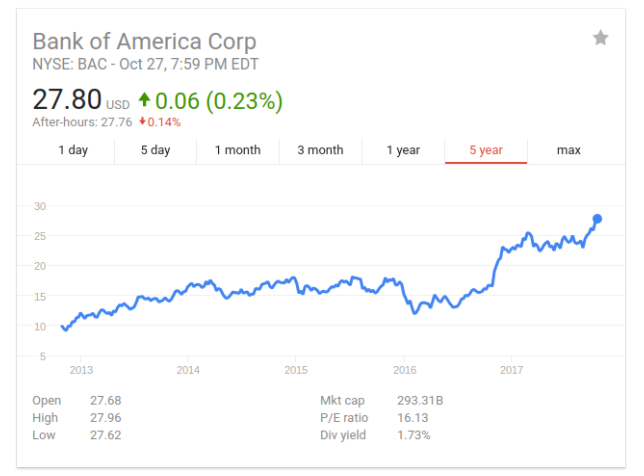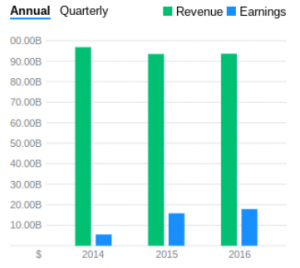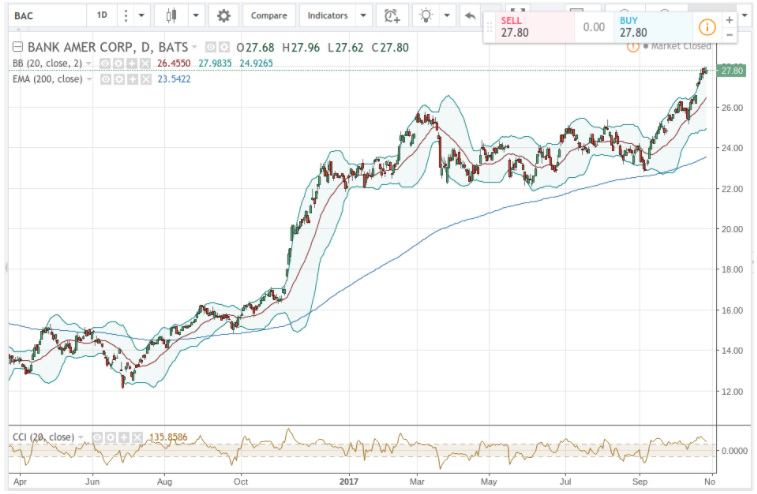Bank of America: Financial Stocks and Federal Reserve Monetary Policy
- The financial sector is rallying strongly, and Bank of America is leading the pack higher.\
- But all eyes are on US President Donald Trump in his next selection for leader of the Federal Reserve.
- These rallies could be at risk depending on the outcome, and shareholders in BAC could be some of the most deeply impacted if certain monetary approaches are favored in Trump’s selection.
Stock markets continue to push in their upward surge and some of the strongest names over the last three months can be found in the financial sector. Leading the pack higher in Bank of America Corp (BAC), which is a stock that we originally bought on the drop to $15 in a trade that is now showing profits of roughly 75% (not including dividends).
The stock recently experienced the major range breakout that we were expecting, and investors that are long the stock will now need to gauge the likely monetary policy direction that is likely to be taken by the Federal Reserve as a means for understanding how to position going forward. This is a factor that is more likely to influence financial sector trends more than any other single element in the equation, and Bank of America could be used by the market as a proxy for expressing any significant changes in the outlook.
Stock Trade Ideas
Our stance is to remain long BAC but with the understanding that adjustments might need to be made if a move dovish monetary policy stance is signalled by Donald Trump’s next selection for leader of the Federal Reserve.

On a year-to-date basis, Bank of America has soundly outperformed the market with stock gains of nearly 26%. We can compare this to the SPDR S&P 500 ETF (SPY), which has moved higher by only 15% for the period even though the broader environment has been characterized by optimism over tax reform and a pro-growth agenda for the US economy.
Global Interest Rates
The disconnect here is significant, as it underscores the majority expectation for higher interest rate into 2018. There are valid arguments in both direction with respect to whether or not these initial expectations have actually been satisfied. But the real questions here lie in the monetary policy direction that will be undertaken by the Fed once its new leadership regime takes control.
Currently, markets are dealing with three possibilities as Fed Chair (John Taylor, Jerome Powell, or the continuation of Janet Yellen in her current position). There are very different implications here depending on which economist is ultimately selected, and those long BAC will almost certainly feel the resultant volatility in their positions over the next few weeks.

BAC Earnings Data: Yahoo Finance
Higher interest rates generally make it easier for banks to drive revenues and improve margins, but the policy course that has been taken by Janet Yellen has been far more dovish than many analysts initially anticipated. We have seen conflicting commentaries from US President Donald Trump with respect to his assessment of Yellen’s approach to the economic recovery.
But, over time, it has started to look as though Trump does favor this supportive stance as it is more likely to drive consumer spending and help stock markets maintain their record highs. But, at the same time, Trump has shown an interest in appointing more hawkish names (i.e. Taylor and Powell).
Fed Policy Direction
On the spectrum from most dovish to most hawkish, this list of possibilities moves from Yellen to Powell to Taylor and so the ultimate decision here will likely determine the trading tone that is seen for most of the first half of next year. For BAC bulls, Taylor would likely lead to the most favorable outcome and this is important given the areas of weakness that were seen in Bank of America’s earnings report for the third quarter.
Earnings of 48 cents per share did beat the market expectation of 45 cents (confirming the longer-term trends) but revenues were more erratic at $22.079 billion (also confirming the longer-term trends). Trading revenues remain the central cause for concern, as annualized revenues from fixed-income trading fell a substantial 22% for the period.

Bank of America Chart Analysis
This has put some cracks in the foundation, and the rallies in BAC could be at risk if the market if not convinced that the next Fed chief is ready to aggressively tighten policy in ways that match normalized historical trends. Given Trump’s recent comments, it would not be entirely surprising to see something of a “compromise verdict” where the US President selects Jerome Powell as Fed Chair and then appoints John Taylor in a secondary role at the central bank.
Anything short of this is likely to lead to selling pressure in BAC. Readjustments in our long position will be considered if an unfavorable outcome sends share prices back below 23 as it would suggest another period of consolidation that cannot be fully mitigated by the stock’s 1.73% dividend yield. Until then, we will hold our positions and collect the dividend while the momentum is still positive.
